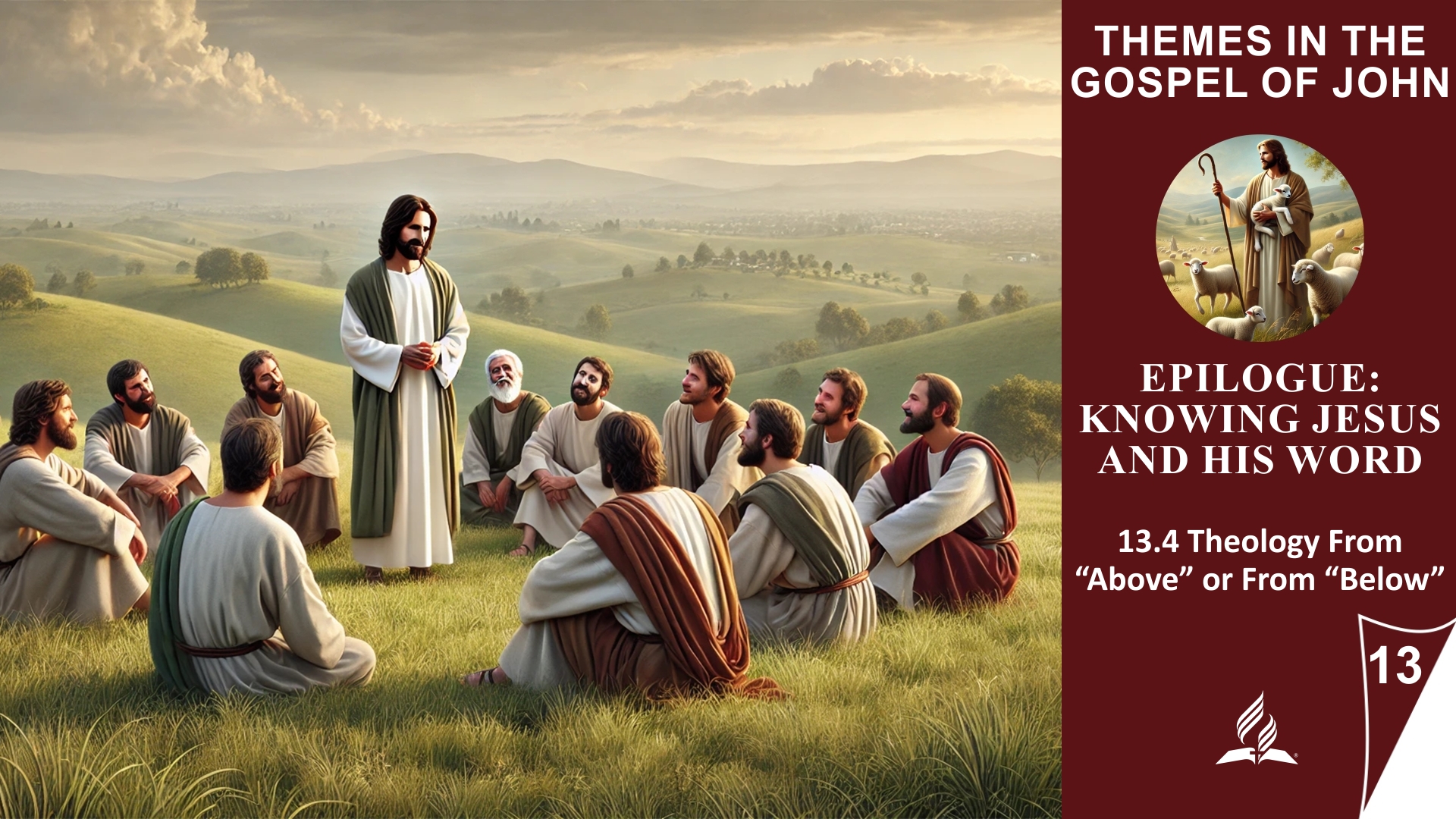


13.4 Theology From “Above” or From “Below”
Faith That Goes Beyond Human Ideas
Read John 4:46–54. What problem did the royal official bring to Jesus? What was the real issue here?
The story of the royal official in John 4:46–54 reveals two fundamental perspectives on faith: a “theology from below,” which is conditional, and a “theology from above,” which is based on unconditional trust in God’s word.
-
The Problem of the Royal Official
The official brings his request to Jesus, but his faith is initially conditional: he expects Jesus to provide the remedy for his need before he can believe. This attitude represents a “theology from below,” where humans tie God’s actions to their own rules and expectations.
-
Jesus’ Challenge
Jesus challenges the official: “Unless you people see signs and wonders, you will never believe” (John 4:48). With this statement, Jesus exposes how often human faith depends on visible evidence or miracles. However, true faith prioritizes God’s word regardless of external circumstances.
-
The Transition to a “Theology from Above”
When Jesus tells the official, “Your son will live” (John 4:50), the official responds with a decisive step of faith: he takes Jesus at his word before seeing the fulfillment. This demonstrates the transition to a “theology from above,” where individuals acknowledge and trust in God’s sovereignty and truth without imposing conditions.
Lessons for Us Today
-
The Danger of a “Theology from Below”
We risk judging God or attaching conditions to our faith if we insist that He fulfills our desires on our timetable. This attitude imposes human ideas over God’s word and plan.
-
The Value of a “Theology from Above”
A “theology from above” calls us to trust in God’s word, even when we do not fully understand His ways. It requires us to let go of our limited understanding and rely on His guidance.
-
Active Faith
True discipleship is not shown in passive listening but in the willingness to do God’s will. Faith becomes alive through obedience and love, as Jesus describes in John 14:23: “Whoever loves me will obey my teaching.”
Practical Application
-
Trust God’s Word: Learn to accept God’s promises, even if their visible fulfillment is still pending.
-
Faith in Action: Act based on God’s word by obeying Him and seeking His will.
-
Overcome Doubts: Do not let human standards or expectations guide you; instead, submit to the wisdom and truth of Scripture.
Conclusion
The story of the royal official illustrates how we can move from doubt and conditional faith to unconditional trust. A “theology from above” challenges us to trust in God’s word and act accordingly, regardless of our desires or immediate fulfillment. It teaches us to place God first and build our relationship with Him on love, trust, and obedience.
What is the connection between our love for Jesus and obedience? Why is any form of “obedience” that is not based on love at risk of becoming legalistic?
The connection between our love for Jesus and obedience is central to understanding an authentic Christian life. True love for Jesus is the foundation and motivation for obedience, while obedience without love can quickly become legalistic and empty religiosity.
-
The Connection Between Love and Obedience
-
Love as the Foundation of Obedience: Jesus says, “Whoever loves me will obey my teaching” (John 14:23). Obedience to Jesus is not a forced duty but the natural response to our love for Him. This love arises from recognizing His love for us: “We love because he first loved us” (1 John 4:19).
-
Loving Jesus means trusting Him and recognizing that His commandments are for our good.
-
-
Obedience as an Expression of Love: Obedience is not an end in itself but a sign of our relationship with Jesus. It shows that we are faithful to Him and acknowledge His lordship in our lives.
-
Love Leads to Joy in Obedience: When obedience is based on love, we do not see it as a burden but as joy. It becomes an opportunity to express our gratitude for His grace and redemption.
-
Why Obedience Without Love Becomes Legalistic
-
Mechanical Obedience: Obedience without love becomes mechanical and superficial. It focuses on rule-following rather than the relationship with Jesus.
-
This type of obedience often leads people to prioritize the adherence to laws over the underlying love and grace.
-
-
Pride or Frustration: Legalism tends to make people either proud or frustrated:
-
Pride: When they believe they are perfectly keeping the commandments.
-
Frustration: When they realize they can never meet God’s high standards on their own.
-
-
Lack of the Spirit of Freedom: Paul warns in Galatians 5:1 that we should live in the freedom of Christ and not return to the bondage of the law. Obedience without love deprives us of the freedom that comes through the Holy Spirit and turns our faith life into a burdensome duty.
-
Love as a Guard Against Legalism
-
Inner Motivation: Love motivates us from within to follow Jesus. It makes obedience a voluntary and joyful response rather than an external fulfillment of regulations.
-
Focus on Jesus: Legalism focuses on rule adherence, while love centers on the person of Jesus. This perspective prevents faith from becoming a rigid checklist of duties.
-
Fulfillment of the Law: Paul writes, “For the entire law is fulfilled in keeping this one command: ‘Love your neighbor as yourself'” (Galatians 5:14). Love automatically fulfills the commandments without engaging in legalism.
-
Practical Applications in Daily Life
-
Obedience Out of Love: Let your love for Jesus motivate you to keep His commandments in your daily life—whether in honesty, forgiveness, or service to others.
-
Examination of Motivation: Regularly ask yourself: “Am I acting out of love for Jesus, or am I trying to earn His favor through performance?”
-
Trust in Grace: Recognize that obedience is not the way to earn God’s love but a response to the grace we have already received in Jesus.
Conclusion
Our love for Jesus and our obedience are closely and inseparably connected. Obedience that does not stem from love easily leads to legalism, which misses the heart of the Gospel. However, when our obedience is motivated by love, it reflects our relationship with Jesus and becomes a source of joy, not a burden. Love protects us from placing rules above grace and teaches us to live in freedom and truth.
The concepts of “theology from above” and “from below” have profound effects on our faith and daily lives. They call us to rethink our thinking, actions, and trust in God.
-
Trusting Despite Uncertainty
In everyday life, we often encounter situations that test our trust: financial difficulties, health problems, or interpersonal conflicts.
-
Faith in Crises: Like the royal official, we tend to set conditions, such as “I will believe if God solves this problem.” However, a “theology from above” teaches us to trust God even when we do not yet see the solution.
Practical Application:
-
-
Pray in difficult moments not only for solutions but also for trust in God’s plan.
-
Trust that God’s ways are higher than yours (Isaiah 55:8-9).
-
-
Obedience Out of Love in Daily Life
True obedience, born out of love, is evident in the small decisions of life:
-
Forgiveness Instead of Resentment: Love motivates us to forgive those who have wronged us instead of judging them by human standards.
-
Honesty and Integrity: Love for Jesus inspires us to be honest and sincere, even when it is more challenging or disadvantageous.
Practical Application:
-
-
Ask yourself in your decisions: “Am I acting out of love for Jesus?”
-
-
Overcoming the Danger of Legalism
Sometimes we slip into a “theology from below” by trying to earn God’s favor through performance or perfection.
-
Letting Go of Perfectionism: Legalism creates pressure and frustration. However, God’s love is independent of our performance.
Practical Application:
-
-
Remind yourself daily that God’s grace sustains you, not your performance.
-
-
A Living Relationship with God’s Word
A “theology from above” calls us to trust God’s word and recognize it as the highest authority in our lives.
-
Daily Bible Study: Read the Bible not just to gain knowledge but to hear God’s voice and apply it to your life.
Practical Application:
-
-
Spend time in prayer and ask the Holy Spirit to help you understand and live according to God’s word.
-
-
Living Faith in Community
A “theology from above” also influences how we treat others:
-
Giving Testimony: By trusting and living according to God’s word, we can show others that faith is not just theoretical but has practical effects on life.
-
Encouragement: Share experiences where God has helped you trust despite uncertainties and encourage others to rely on Him.
Final Conclusion
The story of the royal official reminds us that faith means trusting God’s word even when fulfillment is not visible. A “theology from above” challenges us to be guided by God’s sovereignty and not rely on human standards. This attitude can help us remain steadfast in daily challenges, practice obedience out of love, and live our lives with joy and freedom. God invites us to place Him first and trust Him in everything—a call that profoundly transforms our lives.
Trust in Jesus’ word, even when fulfillment is not yet visible—faith brings healing and hope.
(Visited 28 times, 1 visits today)























